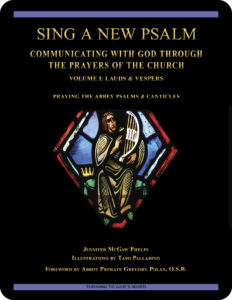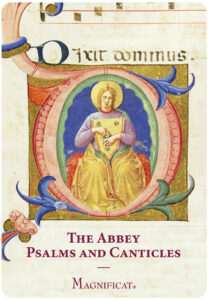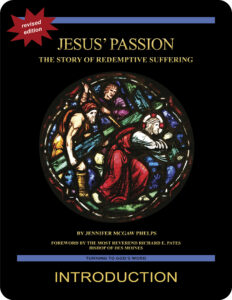 Sing a New Psalm:
Sing a New Psalm:
Communicating with God Through
the Prayers of the Church
Volume I: Lauds & Vespers
Lesson 26 Create a Pure Heart for Me
Psalm 51, Psalm 108, and Psalm 147:12–20
Friday Lauds (Week II)
Revised Standard Version Catholic Edition (RSVCE)*
New American Bible Revised Edition (NABRE)*
Catechism of the Catholic Church
ex libris (in our library)
next lesson: The LORD Remembers Us
This material coordinates with Lesson 26 on pages 106–109 in Sing a New Psalm: Communicating with God Through the Prayers of the Church—Volume I: Lauds & Vespers. Our Catholic Bible study is based on The Abbey Psalms and Canticles, an English translation of the Psalms prepared by the monks at Conception Abbey in 2010 and first published as The Revised Grail Psalms. The Abbey Psalms and Canticles is a revision of that work, finished in 2020 and published by the United States Conference of Catholic Bishops (USCCB). Wording and numbering of some Psalms and verses in other translations may differ. This new translation of the Psalms in the process of being added to all English-language Liturgy of the Hours books used in the United States. The USCCB also plans a liturgical Bible based on the NABRE translation.
The Abbey Psalms and Canticles, an English translation of the Psalms prepared by the monks at Conception Abbey in 2010 and first published as The Revised Grail Psalms. The Abbey Psalms and Canticles is a revision of that work, finished in 2020 and published by the United States Conference of Catholic Bishops (USCCB). Wording and numbering of some Psalms and verses in other translations may differ. This new translation of the Psalms in the process of being added to all English-language Liturgy of the Hours books used in the United States. The USCCB also plans a liturgical Bible based on the NABRE translation.
“Unlike other prayers in sacred Scripture, the prayers contained in the Psalms are not inserted into a narrative story that specifies their meaning and function. Instead, the Psalms are given to the believer precisely as a text of prayer. Since they are the Word of God, the believer who prays the Psalms speaks to God using the very words that God himself has given to us. Thus, in praying the Psalms we learn to pray. The Psalms are a school of prayer.”—Pope Benedict XVI
welcome to our in-depth study of the Psalms
We invite groups and individuals to check out the sample first lesson from this 28- lesson Turning to
lesson Turning to  God’s Word Catholic Bible study. Our online study pages include additional questions, commentary, and prayers based on the Psalm texts. Sing a New Psalm: Communicating with God Through the Prayers of the Church—Volume I: Lauds & Vespers has been granted an imprimatur. A digital version of this study can be purchased from our website shop. Volume II: Vigils, Day Prayer & Compline is scheduled for publication in 2025. If you have a Bible-related question or comment, click on one of the “ask us your question” or “what do you think” buttons on any online study page.
God’s Word Catholic Bible study. Our online study pages include additional questions, commentary, and prayers based on the Psalm texts. Sing a New Psalm: Communicating with God Through the Prayers of the Church—Volume I: Lauds & Vespers has been granted an imprimatur. A digital version of this study can be purchased from our website shop. Volume II: Vigils, Day Prayer & Compline is scheduled for publication in 2025. If you have a Bible-related question or comment, click on one of the “ask us your question” or “what do you think” buttons on any online study page.
open with prayer
It’s always wise to begin any Bible study with prayer, whether reading the Scriptures alone or meeting with others in a discussion study group. You can pray using your own words, pray one of the Psalms in this lesson, or use one of the opening prayers on our website. We especially like the following:
Lord Jesus, you promised to send your Holy Spirit
to teach us all things.
As we read and study your word today,
allow it to touch our hearts and change our lives. Amen.
the heart as the place where our emotion & passion reside
Throughout the Psalms we encounter the idea of the heart as the center of being. For the Psalmist,  the heart represents more than the place where our emotions reside. It serves as the source of motivation for all of our actions. The theme of this lesson—”Create for Me a Pure Heart”—reflects the Psalmist’s desire for God to purify his motives and actions. Turning to God’s Word co-founder Tami Palladino created an illustration that hints at a New Testament understanding of the heart expressed in the Gospel According to Luke 24:32. In that verse, two disciples consider their recent encounter with the risen Christ on the road to Emmaus. They ask: “Did not our hearts burn within us while he talked to us on the road, while he opened to us the Scriptures?” Have any passages from the Scriptures ever caused your heart to burn? In what way might the image of a burning heart indicate love for God? What effect does fire have on an object that is burning? Click on Tami’s illustration (right) to enlarge it. Her original illustration is on page 107 in Sing a New Psalm: Communicating with God Through the Prayers of the Church—Volume I: Lauds & Vespers.
the heart represents more than the place where our emotions reside. It serves as the source of motivation for all of our actions. The theme of this lesson—”Create for Me a Pure Heart”—reflects the Psalmist’s desire for God to purify his motives and actions. Turning to God’s Word co-founder Tami Palladino created an illustration that hints at a New Testament understanding of the heart expressed in the Gospel According to Luke 24:32. In that verse, two disciples consider their recent encounter with the risen Christ on the road to Emmaus. They ask: “Did not our hearts burn within us while he talked to us on the road, while he opened to us the Scriptures?” Have any passages from the Scriptures ever caused your heart to burn? In what way might the image of a burning heart indicate love for God? What effect does fire have on an object that is burning? Click on Tami’s illustration (right) to enlarge it. Her original illustration is on page 107 in Sing a New Psalm: Communicating with God Through the Prayers of the Church—Volume I: Lauds & Vespers.
WHAT DO YOU THINK ABOUT purity of heart?
Take a few minutes to read “Purity” on page 106 in Sing a New Psalm: Communicating with God Through the Prayers of the Church—Volume I: Lauds & Vespers.
? Why do you think it is that purity of heart appears to be so important in Psalm 51, known  as the Miserere?
as the Miserere?
? Psalm 51 opens with an entreaty for God to show mercy to the petitioner. Consider what connection there might be between this plea and the request for a pure heart.
? Have you ever asked God to purify your own heart?
? Consider whether there are any areas of your heart that would benefit from such a request.
 the popes inspire us—relax & count on God’s plan
the popes inspire us—relax & count on God’s plan
“A Superior Plan Governs History” on page 107 in Sing a New Psalm: Communicating with God Through the Prayers of the Church—Volume I: Lauds & Vespers is from an audience with Pope St. John Paul II, who sees in Psalm 108 evidence of the LORD’s glory through deliverance of his people. Because the LORD continues to reign, God’s people have nothing to fear. The Holy Father agrees with the Psalmist: Evil forces are no match for the LORD of hosts.
purity—you could look it up in our archives
 The Psalms aren’t the only place in the Bible where purity is addressed. In the Gospels, ritual purity is one of the main points of conflict between Jesus and the Pharisees, with Jesus strongly coming down on the side of purity of heart. To learn more, read Lost in Translation, an online column in which Turning to God’s Word author Matthew Phelps helps readers connect with ideas expressed in the original languages of the Scriptures. New Lost in Translation entries are posted on Mondays, and past entries are archived on our website. Contact us if you’d like to receive Lost in Translation by email every week.
The Psalms aren’t the only place in the Bible where purity is addressed. In the Gospels, ritual purity is one of the main points of conflict between Jesus and the Pharisees, with Jesus strongly coming down on the side of purity of heart. To learn more, read Lost in Translation, an online column in which Turning to God’s Word author Matthew Phelps helps readers connect with ideas expressed in the original languages of the Scriptures. New Lost in Translation entries are posted on Mondays, and past entries are archived on our website. Contact us if you’d like to receive Lost in Translation by email every week.
read the Catechism—purity of heart precludes mortal sin
Most Catholics are familiar with the three things necessary in order for a sin to be considered mortal. Paragraph 1857 in the Catechism of the Catholic Church teaches that for a sin to be mortal it must involve grave matter, it must be committed with full knowledge, and it must be committed with deliberate consent. Paragraph 1855 in the Catechism of the Catholic Church describes the spiritual damage inflicted even by venial sin.
describes the spiritual damage inflicted even by venial sin.
1855 Mortal sin destroys charity in the heart of man by a grave violation of God’s law; it turns man away from God, who is his ultimate end and his beatitude, by preferring an inferior good to him.
Venial sin allows charity to subsist, even though it offends and wounds it.
a content change between first & later editions
Second and subsequent editions of Sing a New Psalm: Communicating with God Through the Prayers of the Church—Volume I: Lauds & Vespers substitute the following commentary on page 108 for “Dawn Awakened,” material now covered in the excerpt of remarks by Pope St. John Paul II on page 43.
Hearts Aflame
Throughout the Psalms, the heart represents the source of motivation for all that men and women do. In Psalm 51, when the Psalmist asks the LORD to create a pure heart for him, he is asking God to purify his motives. Such purification often is accomplished with fire.
In the Gospel According to Luke 24:32, two disciples discuss their encounter with the risen Christ, and ask: “Did not our hearts burn within us while he talked to us on the road, while he opened to us the Scriptures?” In Acts of the Apostles 2:1–4, the Holy Spirit descends on the apostles in the form of tongues of flame. Do you find it appealing or frightening to think about your own heart burning for Christ?
the best Catholic commentary about Scripture
 To find out more about how Church teaching is supported by passages in Sing a New Psalm: Communicating with God Through the Prayers of the Church—Volume I: Lauds & Vespers, check out the Index of Citations in the Catechism of the Catholic Church. Links to the primary Scripture passages in the lesson (Revised Standard Version Catholic Edition [RSVCE*]) and relevant paragraphs in the Catechism are provided here. Not every passage in the biblical text for this study is referenced in a Catechism paragraph, however, including Psalm 108 and Psalm 147:12–20 in this lesson.
To find out more about how Church teaching is supported by passages in Sing a New Psalm: Communicating with God Through the Prayers of the Church—Volume I: Lauds & Vespers, check out the Index of Citations in the Catechism of the Catholic Church. Links to the primary Scripture passages in the lesson (Revised Standard Version Catholic Edition [RSVCE*]) and relevant paragraphs in the Catechism are provided here. Not every passage in the biblical text for this study is referenced in a Catechism paragraph, however, including Psalm 108 and Psalm 147:12–20 in this lesson.
Psalm 51:6—paragraphs 431, 1850
Psalm 51:12—paragraphs 298, 431
Psalm 51:19—paragraphs 1428, 2100
don’t forget about our indexes & extra online material

 If you’re trying to locate information about a specific Scripture passage, you can look it up in the index at the back of the study book or sample lesson. If you want to find a particular commentary, you can look up its title in the topics index. To learn more about another book of the Bible for which there’s a Turning to God’s Word study, visit the online study directories to read the commentaries and watch any accompanying videos. Finally, if you have a question or would like to make a comment about any of our studies, you can use one of the “ask us your question” or “what do you think” buttons to email our authors.
If you’re trying to locate information about a specific Scripture passage, you can look it up in the index at the back of the study book or sample lesson. If you want to find a particular commentary, you can look up its title in the topics index. To learn more about another book of the Bible for which there’s a Turning to God’s Word study, visit the online study directories to read the commentaries and watch any accompanying videos. Finally, if you have a question or would like to make a comment about any of our studies, you can use one of the “ask us your question” or “what do you think” buttons to email our authors.
ex libris—Church documents & books about religious topics
Link to magisterial documents referred to in our Bible studies at ex libris—magisterial documents.  This listing includes significant recent encyclicals as well as a number of historical Church documents. Recommended books related to Scripture study can be found at ex libris—main bookshelf.
This listing includes significant recent encyclicals as well as a number of historical Church documents. Recommended books related to Scripture study can be found at ex libris—main bookshelf.
wondering how to pronounce some of these words?
The following links are to readings from the New International Version (NIV) Bible. To listen, open one of the links and click on the audio icon above the printed text. Although not taken from the translations used in our study materials, the NIV readings provide an audio guide to pronunciation of words in this lesson’s primary biblical texts. A close online version of the translation of the Bible used in Catholic liturgy in the United States as well as an audio guide for daily Mass readings for the current month can be found on the website of the United States Conference of Catholic Bishops (USCCB).
Psalm 51 (NIV)
Psalm 108 (NIV)
Psalm 147:12–20 (NIV)
 close with a Psalms-based prayer for Friday Lauds (Week II)
close with a Psalms-based prayer for Friday Lauds (Week II)
Many of our Catholic study groups like to conclude their discussions with a prayer based on the scriptural focus of their lesson. If you’re uncomfortable composing your own Bible-based prayers, you can follow our four easy steps. If you prefer, you can pray any of the Psalms in this lesson, or you can use the following short prayer.
O God, you are the source of all wisdom.
Give us hearts overflowing with the gifts of the Holy Spirit—
fear of the Lord, fortitude, knowledge, counsel,
understanding, wisdom, and piety.
Teach us to turn to you in humility
that we might receive your mercy.
We ask this in the name of your Son, Jesus Christ,
whose Sacred Heart burns with love for us. Amen.
Lesson 27 The LORD Remembers Us, Friday Vespers (Week II)—Psalm 115, Psalm 116:1–9, and Psalm 139
Lesson 25 What Is Man That You Regard Him? Thursday Vespers (Week II)—Psalm 144 and Psalm 145
you also may like our free Lenten study of Jesus’ Passion (digital only)
 Jesus’ Passion: The Story of Redemptive Suffering is a five-lesson Catholic Bible study offering an in-depth look at the biblical foundations of the movie The Passion of the Christ. This revised study, which has been granted an imprimatur, contains all of the original material of the 2004 edition as well as many new features in an improved, reader-friendly format. Click on the book’s cover to view the introduction. Free digital lessons of Jesus’ Passion: The Story of Redemptive Suffering are available on the website during Lent.
Jesus’ Passion: The Story of Redemptive Suffering is a five-lesson Catholic Bible study offering an in-depth look at the biblical foundations of the movie The Passion of the Christ. This revised study, which has been granted an imprimatur, contains all of the original material of the 2004 edition as well as many new features in an improved, reader-friendly format. Click on the book’s cover to view the introduction. Free digital lessons of Jesus’ Passion: The Story of Redemptive Suffering are available on the website during Lent.
start a Turning to God’s Word Bible study
Thank you for your interest in Sing a New Psalm: Communicating with God Through the Prayers of the Church—Volume I: Lauds & Vespers. 
 More information about beginning a Turning to God’s Word Bible study can be found on this website at start a Bible study, and Tami, Matthew, and I are available to answer questions or discuss concerns. Contact us to start this or one of our other studies or to have your schedule listed with other TtGW study groups on our website. —Jennifer
More information about beginning a Turning to God’s Word Bible study can be found on this website at start a Bible study, and Tami, Matthew, and I are available to answer questions or discuss concerns. Contact us to start this or one of our other studies or to have your schedule listed with other TtGW study groups on our website. —Jennifer
*There are seven deuterocanonical books in the Old Testament—the Books of Tobit, Judith, Wisdom, Sirach, Baruch, and First and Second Maccabees, as well as some passages in the Books of Esther and Daniel. Protestants usually refer to these works as “apocryphal,” a word that means “outside the (Protestant) canon” because they’re excluded from most Protestant Bibles. The word “deuterocanonical” means “second canon”; Catholics use that word to refer to any section of the Catholic Old Testament for which there are no extant, or existing, Hebrew manuscripts. All of the deuterocanonical books appear in the Septuagint, the earliest remaining versions of which date to the 1st century B.C. This Greek translation of the Old Testament was in common use by Jews at the time of Jesus. Learn more by reading How Do Catholic & Protestant Bibles Differ?
Turning to God’s Word printed Bible studies use the 2006 Revised Standard Version Second Catholic Edition (RSV2CE) translation for all Scripture references except the Psalms, which are taken from The Abbey Psalms and Canticles, prepared by the monks of Conception Abbey and published in 2020 by the United States Conference of Catholic Bishops (USCCB). All Scripture links for the online study pages for Sing a New Psalm: Communicating with God Through the Prayers of the Church—Volume I: Lauds & Vespers are to the 1966 Revised Standard Version Catholic Edition (RSVCE) translation. The New International Version (NIV) audio recordings follow the same chapter and verse numbering as the RSV Catholic translations, but the NIV doesn’t include the deuterocanonical passages.
The 1966 RSVCE uses archaic pronouns and verb forms such as “thee,” “thou,” “didst” in the Psalms and in direct quotations attributed to God. The 2006 RSV2CE replaces these with more accessible English. The few significant translation changes in the RSV2CE include rendering almah as “virgin” in the Book of Isaiah 7:14 and restoring the term “begotten” in the Gospel According to John 3:16.
The Psalms in this Bible study reflect numbering used in The Abbey Psalms and Canticles; Psalms numbering may vary in other translations. Numbering also may vary for a few other passages in this Bible study. Turning to God’s Word studies follow the numbering in the Revised Standard Version Catholic translations (RSVCE and RSV2CE). Discrepancies in the New American Bible Revised Edition (NABRE) are noted in the Index of Scripture Citations in the study book and the online sample.
 The companion to this Catholic Bible study from Turning to God’s Word, Sing a New Psalm: Communicating with God Through the Prayers of the Church—Volume II: Vigils, Day Prayer & Compline, will cover Psalms not included in Volume I: Lauds & Vespers. Volume II: Vigils, Day Prayer & Compline is scheduled for publication in 2025.
The companion to this Catholic Bible study from Turning to God’s Word, Sing a New Psalm: Communicating with God Through the Prayers of the Church—Volume II: Vigils, Day Prayer & Compline, will cover Psalms not included in Volume I: Lauds & Vespers. Volume II: Vigils, Day Prayer & Compline is scheduled for publication in 2025.
